Politics
President Biden oks change to filibuster for voting rights
Biden and the Vice-President Kamala Harris address the urgent need to pass legislation to protect the constitutional right to vote
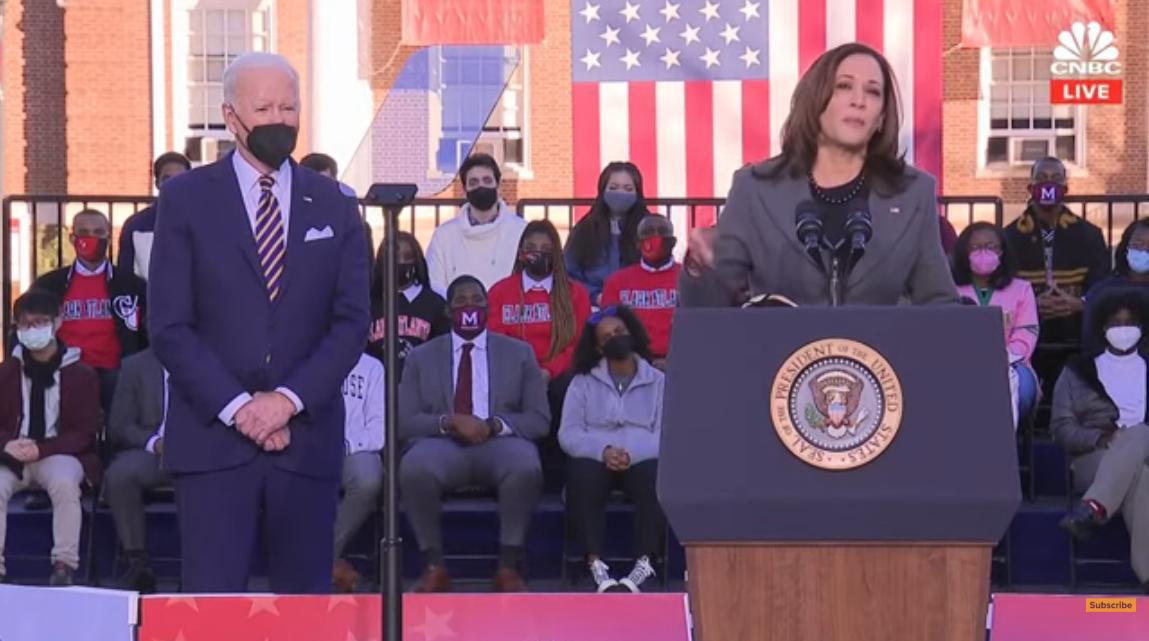
ATLANTA – President Biden, after paying tribute to civil rights pioneer Dr. Martin Luther King Jr. by leaving a wreath on his grave, brought the strength of his presidency to bear in a speech Tuesday in an effort to reform U.S. Senate rules to enact voting rights legislation.
“I’m making it clear, to protect our democracy, I support changing Senate rules whichever way they need to changed to prevent a minority of senators from blocking basic voting rights,” Biden said.
Biden has indicated before he supports changes to longstanding rules the Senate requiring 60 votes to end a filibuster and proceed with debate on legislation, but the speech marks an elevation of viewpoint in a more formal way and increases the pressure on fellow Democrats like Joe Manchin (W.Va.) and Kyrsten Sinema (Ariz.), who oppose such a change.
Based on his words, Biden’s position on filibuster reform appears limited to voting rights legislation, which like so much other legislation has passed in the House and has stalled out in the Senate. The Washington Blade has placed a request in with the White House seeking comment on why, if Biden supports changing the filibuster for voting rights, why hasn’t he made the case for other issues, such as police reform or LGBTQ civil rights.
A major reason cited by Biden to bring the force of his presidency down on this issue: The attack on U.S. Capitol on Jan. 6, 2021 instigated by President Trump, who falsely claimed he won the 2020 election against Biden.
Biden conjured images of the long road in the civil rights journey in the United States and a “violet riot” at the Capitol that Biden said undermined the process.
The recently enacted voter law in Georgia, which makes mail-in voting illegal, limits hours and locations for ballot drop boxes and bars the delivery of food and water to persons waiting in line to vote, was another major focus for Biden, who pointed out Republican lawmakers in Georgia put it in place after he won the state in 2020 and Trump pressured officials there to find more votes for him.
As a result, Biden said the “threat to democracy is so grave” he supports changes to the filibuster, which came about in use in the Senate from senators seeking to block civili rights legislation.
“If that bare minimum is blocked, we have no choice but change the Senate rules, including getting rid of the filibuster for this,” Biden said.
Biden identified two bills in his speech: the John Lewis Voting Rights Act, which seeks to rectify a U.S. Supreme Court decision undermining the Voting Rights Act and the Freedom of the Vote Act, which would dramatically reform voting process, including the expansion of voting by mail and early voting.
Joining Biden in Atlanta in favor of changing rules to advance voting rights was Vice President Kamala Harris, who said “nowhere — nowhere — does the Constitution give a minority the right to unilaterally block legislation.”
“Over the past few years, we have seen so many anti-voter laws, that there is a danger of becoming accustomed to these laws, a danger of adjusting to these laws as though they are normal, a danger of becoming complacent, complicit,” Harris said. “Anti-voter laws are not new in our nation, but we must not be deceived into thinking they are normal.”
********************
President Biden and Vice President Harris deliver voting rights speech in Atlanta:
********************
Full text of the president’s remarks:
In our lives and the lives of our nation — the life of our nation, there are moments so stark that they divide all that came before from everything that followed. They stop time. They rip away the trivial from the essential. And they force us to confront hard truths about ourselves, about our institutions, and about our democracy.
In the words of Scripture, they remind us to “hate evil, love good, and establish justice in the gate.”
Last week, [Vice] President Harris and I stood in the United States Capitol to observe one of those “before and after” moments in American history: January 6th insurrection on the citadel of our democracy.
Today, we come to Atlanta — the cradle of civil rights — to make clear what must come after that dreadful day when a dagger was literally held at the throat of American democracy.
We stand on the grounds that connect Clark Atlanta — Atlanta University, Morehouse College, and near Spelman College — the home of generations of advocates, activists, educators and preachers; young people, just like the students here, who have done so much to build a better America.
We visited the sacred Ebenezer Baptist Church and paused to prayed at the crypt of Dr. and Mrs. King, and spent time with their family. And here in the district — as was pointed out — represented and reflected the life of beloved friend, John Lewis.
In their lifetimes, time stopped when a bomb blew up the 16th Street Baptist Church in Birmingham and murdered four little girls.They [Time] stopped when John and many others seeking justice were beaten and bloodied while crossing the bridge at Selma named after the Grand Dragon of the Ku Klux Klan.
They stopped — time stopped, and they forced the country to confront the hard truths and to act — to act to keep the promise of America alive: the promise that holds that we’re all created equal but, more importantly, deserve to be treated equally. And from those moments of darkness and despair came light and hope.
Democrats, Republicans, and independents worked to pass the historic Civil Rights Act and the voting rights legislation. And each successive generation continued that ongoing work.
But then the violent mob of January 6th, 2021, empowered and encouraged by a defeated former president, sought to win through violence what he had lost at the ballot box, to impose the will of the mob, to overturn a free and fair election, and, for the first time — the first time in American history, they — to stop the peaceful transfer of power.
They failed. They failed. (Applause.) But democracy’s — but democracy’s visi- — victory was not certain, nor is democracy’s future.
That’s why we’re here today to stand against the forces in America that value power over principle, forces that attempted a coup — a coup against the legally expressed will of the American people — by sowing doubt, inventing charges of fraud, and seeking to steal the 2020 election from the people.
They want chaos to reign. We want the people to rule.
But let me be clear: This is not about me or Vice President Harris or our party; it’s about all of us. It’s about the people. It’s about America.
Hear me plainly: The battle for the soul of America is not over. We must stand strong and stand together to make sure January 6th marks not the end of democracy but the beginning of a renaissance of our democracy.
You know, for the right to vote and to have that vote counted is democracy’s threshold liberty. Without it, nothing is possible, but with it, anything is possible.
But while the denial of fair and free elections is un-democratic, it is not unprecedented.
Black Americans were denied full citizenship and voting rights until 1965. Women were denied the right to vote until just 100 years ago. The United States Supreme Court, in recent years, has weakened the Voting Rights Act. And now the defeated former president and his supporters use the Big Lie about the 2020 election to fuel torrent and torment and anti-voting laws — new laws designed to suppress your vote, to subvert our elections.
Here in Georgia, for years, you’ve done the hard work of democracy: registering voters, educating voters, getting voters to the polls. You’ve built a broad coalition of voters: Black, white, Latino, Asian American, urban, suburban, rural, working class, and middle class.
And it’s worked: You’ve changed the state by bringing more people, legally, to the polls. That’s how you won the historic elections of Senator Raphael Warnock and Senator Jon Ossoff.
You did it — you did it the right way, the democratic way.
And what’s been the reaction of Republicans in Georgia? Choose the wrong way, the undemocratic way. To them, too many people voting in a democracy is a problem. So they’re putting up obstacles.
For example, voting by mail is a safe and convenient way to get more people to vote, so they’re making it harder for you to vote by mail.
The same way, I might add, in the 2020 Election, President Trump voted from behind the desk in the White House — in Florida.
Dropping your ballots off to secure drop boxes — it’s safe, it’s convenient, and you get more people to vote. So they’re limiting the number of drop boxes and the hours you can use them.
Taking away the options has a predictable effect: longer lines at the polls, lines that can last for hours. You’ve seen it with your own eyes. People get tired and they get hungry.
When the Bible teaches us to feed the hungry and give water to the thirsty, the new Georgia law actually makes it illegal — think of this — I mean, it’s 2020, and now ’22, going into that election — it makes it illegal to bring your neighbors, your fellow voters food or water while they wait in line to vote. What in the hell — heck are we talking about?
I mean, think about it. (Applause.) That’s not America. That’s what it looks like when they suppress the right to vote.
And here’s how they plan to subvert the election: The Georgia Republican Party, the state legislature has now given itself the power to make it easier for partisan actors — their cronies — to remove local election officials.
Think about that. What happened in the last election? The former president and allies pursued, threatened, and intimidated state and local election officials.
Election workers — ordinary citizens — were subject to death threats, menacing phone calls, people stalking them in their homes.
Remember what the defeated former president said to the highest-ranking election official — a Republican — in this state? He said, quote, “I just want to find 11,780 votes.”
Pray God. He didn’t say that part.
He didn’t say, “Count the votes.” He said, “find votes” that he needed to win.
He failed because of the courageous officials — Democrats, Republicans — who did their duty and upheld the law.
But with this new law in Georgia, his loyal- — his loyalists will be placed in charge of state elections. What is that going to mean? Well, the chances for chaos and subversion are even greater as partisans seek the result they want — no matter what the voters have said, no matter what the count. The votes of nearly 5 million Georgians will be up for grabs if that law holds.
It’s not just here in Georgia. Last year alone, 19 states not proposed but enacted 34 laws attacking voting rights. There were nearly 400 additional bills Republican members of state legislatures tried to pass. And now, Republican legislators in several states have already announced plans to escalate the onslaught this year.
Their endgame? To turn the will of the voters into a mere suggestion — something states can respect or ignore.
Jim Crow 2.0 is about two insidious things: voter suppression and election subversion. It’s no longer about who gets to vote; it’s about making it harder to vote. It’s about who gets to count the vote and whether your vote counts at all.
It’s not hyperbole; this is a fact.
Look, this matters to all of us. The goal of the former president and his allies is to disenfranchise anyone who votes against them. Simple as that. The facts won’t matter; your vote won’t matter. They’ll just decide what they want and then do it.
That’s the kind of power you see in totalitarian states, not in democracies.
We must be vigilant.
And the world is watching. I know the majority of the world leaders — the good and the bad ones, adversaries and allies alike. They’re watching American democracy and seeing whether we can meet this moment. And that’s not hyperbole.
When I showed up at the G7 with seven other world leaders — there were a total of nine present — Vice President Harris and I have spent our careers doing this work — I said, “America is back.” And the response was, “For how long?” “For how long?”
As someone who’s worked in foreign policy my whole life, I never thought I would ever hear our allies say something like that.
Over the past year, we’ve directed federal agencies to promote access to voting, led by the Vice President. We’ve appointed top civil rights advocates to help the U.S. Department of Justice, which has doubled its voting rights enforcement staff.
And today, we call on Congress to get done what history will judge: Pass the Freedom to Vote Act. Pass it now — which would prevent voter suppression so that here in Georgia there’s full access to voting by mail, there are enough drop boxes during enough hours so that you can bring food and water as well to people waiting in line.
The Freedom to Vote Act takes on election subversion to protect nonpartisan electors [election] officials, who are doing their job, from intimidation and interference.
It would get dark money out of politics, create fairer district maps and ending partisan gerrymandering.
Look, it’s also time to pass the John Lewis Voting Rights Advancement Act.
I’ve been having these quiet conversations with the members of Congress for the last two months. I’m tired of being quiet!
Folks, it’ll restore the strength of the Voting Rights Act of ’65 — the one President Johnson signed after John Lewis was beaten, nearly killed on Bloody Sunday, only to have the Supreme Court weaken it multiple times over the past decade.
Restoring the Voting Rights Act would mean the Justice Department can stop discriminatory laws before they go into effect — before they go into effect.
The Vice President and I have supported voting rights bills since day one of this administration. But each and every time, Senate Republicans have blocked the way. Republicans oppose even debating the issue. You hear me?
I’ve been around the Senate a long time. I was Vice President for eight years. I’ve never seen a circumstance where not one single Republican has a voice that’s ready to speak for justice now.
When I was a senator, including when I headed up the Judiciary Committee, I helped reauthorize the Voting [Rights] Act three times. We held hearings. We debated. We voted. I was able to extend the Voting Rights Act for 25 years.
In 2006, the Voting Rights Act passed 390 to 33 in
the House of Representatives and 98 to 0 in the Senate with votes from 16 current sitting Republicans in this United States Senate. Sixteen of them voted to extend it.
The last year I was chairman, as some of my friends sitting down here will tell you, Strom Thurmond voted to extend the Voting Rights Act. Strom Thurmond.
But, folks, then it was signed into law, the last time, by President George W. Bush.
You know, when we got voting rights extended in the 1980s, as I’ve said, even Thurmond supported it. Think about that. The man who led the longest filibu- — one of the longest filibusters in history in the United States Senate in 1957 against the Voting Rights Act [Civil Rights Act]. The man who led and sided with the old Southern Bulls in the United States Senate to perpetuate segregation in this nation. Even Strom Thurmond came to support voting rights.
But Republicans today can’t and won’t. Not a single Republican has displayed the courage to stand up to a defeated president to protect America’s right to vote. Not one. Not one.
We have 50-50 in the United States Senate. That means we have 51 presidents. (Laughter.) You all think I’m kidding.
I’ve been pretty good at working with senators my whole career. But, man, when you got 51 presidents, it gets harder. Any one can change the outcome.
Sadly, the United States Senate — designed to be the world’s greatest deliberative body — has been rendered a shell of its former self. It gives me no satisfaction in saying that, as an institutionalist, as a man who was honored to serve in the Senate.
But as an institutionalist, I believe that the threat to
our democracy is so grave that we must find a way to pass these voting rights bills, debate them, vote.
Let the majority prevail. And if that bare minimum is blocked, we have no option but to change the Senate rules, including getting rid of the filibuster for this.
You know, last year, if I’m not mistaken, the filibuster was used 154 times. The filibuster has been used to generate compromise in the past and promote some bipartisanship. But it’s also been used to obstruct — including and especially obstruct civil rights and voting rights.
And when it was used, senators traditionally used to have to stand and speak at their desks for however long it took, and sometimes it took hours. And when they sat down, if no one immediately stood up, anyone could call for a vote or the debate ended.
But that doesn’t happen today. Senators no longer even have to speak one word. The filibuster is not used by Republicans to bring the Senate together but to pull it further apart.
The filibuster has been weaponized and abused.
While the state legislatures’ assault on voting rights is simple — all you need in your House and Senate is a pure majority — in the United States Senate, it takes a supermajority: 60 votes, even to get a vote — instead of 50 — to protect the right to vote.
State legislatures can pass anti-voting laws with simple majorities. If they can do that, then the United States Senate should be able to protect voting rights by a simple majority.
Today I’m making it clear: To protect our democracy, I support changing the Senate rules, whichever way they need to be changed — (applause) — to prevent a minority of senators from blocking action on voting rights.
When it comes to protecting majority rule in America, the majority should rule in the United States Senate.
I make this announcement with careful deliberation, recognizing the fundamental right to vote is the right from which all other rights flow.
And I make it with an appeal to my Republican colleagues, to those Republicans who believe in the rule of law: Restore the bipartisan tradition of voting rights.
The people who restored it, who abided by it in the past were Richard Nixon, Gerald Ford, Ronald Reagan, George H.W. Bush, George W. Bush. They all supported the Voting Rights Act.
Don’t let the Republican Party morph into something else. Restore the institution of the Senate the way it was designed to be.
Senate rules were just changed to raise the debt ceiling so we wouldn’t renege on our debt for the first time in our history and prevent an economic crisis. That was done by a simple majority.
As Senator Warnock said a few weeks ago in a powerful speech: If we change the rules to protect the full faith and credit of the United States, we should be able to change the rules to protect the heart and soul of our democracy. He was right.
In the days that followed John Lewis’s death, there was an outpouring of praise and support across the political spectrum.
But as we stand here today, it isn’t enough just to praise his memory. We must translate eulogy into action. We need to follow John Lewis’s footsteps. We need to support the bill in his name.
Just a few days ago, we talked about — up in the Congress and in the White House — the event coming up shortly to celebrate Dr. King’s birthday. And Americans of all stripes will praise him for the content of his character.
But as Dr. King’s family said before, it’s not enough to praise their father. They even said: On this holiday, don’t celebrate his birthday unless you’re willing to support what he lived for and what he died for. The next few days, when these bills come to a vote, will mark a turning point in this nation’s history.
We will choose — the issue is: Will we choose democracy over autocracy, light over shadows, justice over injustice?
I know where I stand. I will not yield. I will not flinch. I will defend the right to vote, our democracy against all enemies — foreign and, yes, domestic.
And the question is: Where will the institution of the United States Senate stand? Every senator — Democrat, Republican, and independent — will have to declare where they stand, not just for the moment, but for the ages.
Will you stand against voter suppression? Yes or no? That’s the question they’ll answer. Will you stand against election subversion? Yes or no? Will you stand for democracy? Yes or no?
And here’s one thing every senator and every American should remember: History has never been kind to those who have sided with voter suppression over voters’ rights. And it will be even less kind for those who side with election subversion.
So, I ask every elected official in America: How do you want to be remembered?
At consequential moments in history, they present a choice: Do you want to be the si- — on the side of Dr. King or George Wallace? Do you want to be on the side of John Lewis or Bull Connor? Do you want to be on the side of Abraham Lincoln or Jefferson Davis?
This is the moment to decide to defend our elections, to defend our democracy.
And if you do that, you will not be alone. That’s because the struggle to protect voting rights has never been borne by one group alone.
We saw Freedom Riders of every race. Leaders of every faith marching arm in arm. And, yes, Democrats and Republicans in Congress of the United States and in the presidency.
I did not live the struggle of Douglass, Tubman, King, Lewis, Goodman, Chaney, and Schwerner, and countless others — known and unknown.
I did not walk in the shoes of generations of students who walked these grounds. But I walked other grounds. Because I’m so damn old, I was there as well.
You think I’m kidding, man. It seems like yesterday the first time I got arrested. Anyway —
But their struggles here — they were the ones that opened my eyes as a high school student in the late — in the late ’50s and early ’60s. They got me more engaged in the work of my life.
And what we’re talking about today is rooted in the very idea of America — the idea that Annell Ponder, who graduated from Clark Atlanta, captured in a single word. She was a teacher and librarian who was also an unyielding champion of voting rights.
In 1963 — when I was just starting college at university — after registering voters in Mississippi, she was pulled off a bus, arrested, and jailed, where she was brutally beaten.
In her cell, next to her, was Fannie Lou Hamer, who described the beating this way, and I quote: “I could hear the sounds of [the] licks and [the] horrible screams…They beat her, I don’t know [for] how long. And after a while, she began to pray, and asked God to have mercy on those people.”
Annell Ponder’s friends visited her the next day. Her face was badly swollen. She could hardly talk.
But she managed to whi- — whisper one word: “Freedom.” “Freedom” — the only word she whispered.
After nearly 250 years since our founding, that singular idea still echoes. But it’s up to all of us to make sure it never fades, especially the students here — your generation that just started voting — as there are those who are trying to take away that vi- — vote you just started to be able to exercise.
But the giants we honor today were your age when they made clear who we must be as a nation. Not a joke. Think about it. In the early ’60s, they were sitting where you’re sitting. They were you. And like them, you give me much hope for the future.
Before and after in our lives — and in the life of the nation — democracy is who we are, who we must be — now and forever. So, let’s stand in this breach together. Let’s love good, establish justice in the gate.
And remember, as I said, there is one — this is one of those defining moments in American history: Each of those who vote will be remembered by class after class, in the ’50s and ’60s — the 2050s and ’60s. Each one of the members of the Senate is going to be judged by history on where they stood before the vote and where they stood after the vote.
There’s no escape. So, let’s get back to work.
As my fath- — my grandfather Finnegan used to say every time I walked out the door in Scranton, he’d say, “Joey, keep the faith.” Then he’d say, “No, Joey, spread it.”
Let’s spread the faith and get this done.
May God bless you all. And may God protect the sacred right to vote. Thank you. I mean it. Let’s go get this done. Thank you.
Congress
Padilla speaks at ‘ICE Out for Good’ protest in D.C.
ICE agent killed Renee Nicole Good in Minneapolis on Jan. 7
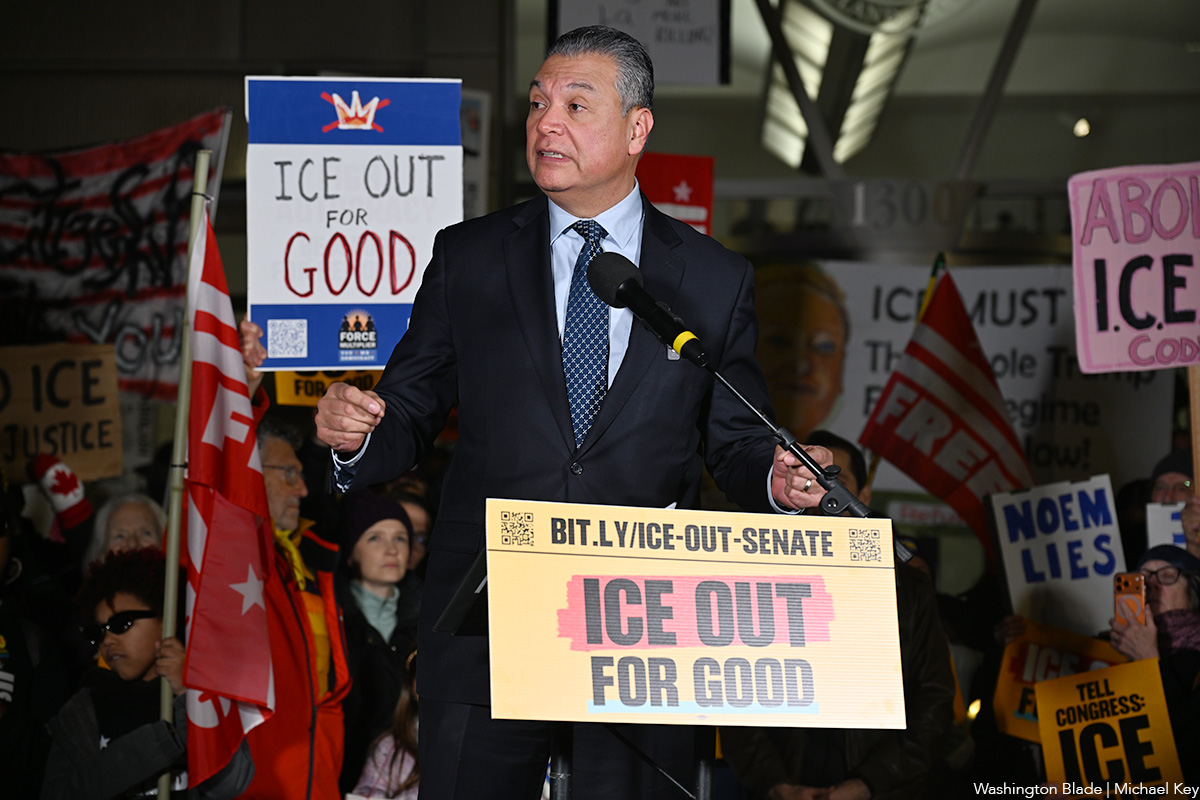
U.S. Sen. Alex Padilla (D-Md.) is among those who spoke at an “ICE Out for Good” protest that took place outside U.S. Customs and Border Protection’s headquarters in D.C. on Tuesday.
The protest took place six days after a U.S. Immigration and Customs Enforcement agent shot and killed Renee Nicole Good, a 37-year-old woman in Minneapolis.
Good left behind her wife and three children.
(Video by Michael K. Lavers)
Politics
LGBTQ Democrats say they’re ready to fight to win in 2026
Queer leaders warn Democrats not to abandon trans people
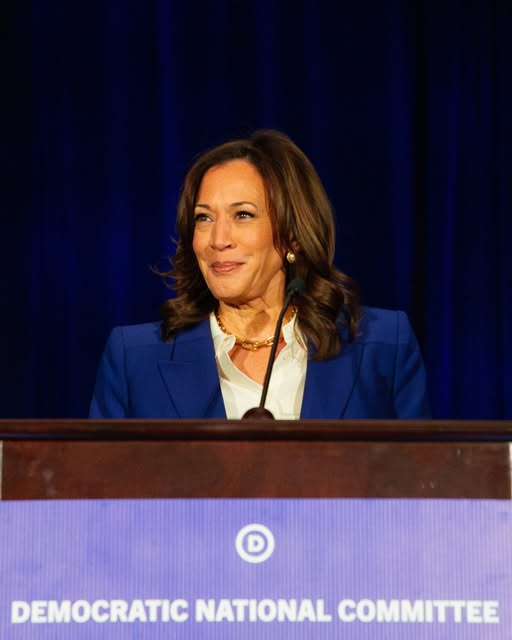
The Democratic National Committee held its annual winter meetings in Downtown Los Angeles over the weekend, and queer Democrats showed up with a clear message for the national organization: Don’t abandon queer and trans people.
Following last year’s disastrous presidential and congressional elections, many influential pundits and some powerful lawmakers called on Democrats to distance the party from unpopular positions on trans rights, in order to win swing districts by wooing more conservative voters.
But members of the DNC’s LGBTQ Caucus say that’s actually a losing strategy.
“There are still parts of our party saying we need to abandon trans people in order to win elections, which is just not provable, actually. It’s just some feelings from some old consultants in DC,” LGBTQ Caucus Chair Sean Meloy says.
Some national Democrats are already backtracking from suggestions that they walk back on trans rights.
California Governor Gavin Newsom grabbed national attention in March when he suggested that it was “deeply unfair” for trans girls to play in women’s sports. But last week, he doubled down on support for trans rights, claiming to have signed more trans-rights legislation than any governor in the country, and entering into feuds on X with Elon Musk and Nicki Minaj over his support for trans kids.
Democrats are also clearly feeling the wind in their sails recently after major election victories in Virginia and New Jersey last month, as well as victories in dozens of local and state legislative elections across the country in 2025.
“[Abigail] Spanberger in Virginia didn’t win by dodging the trans question. She won by attacking it, confronting it, and that’s how she got ahead,” says Vivian Smotherman, trans activist and at-large member of the DNC’s LGBTQ Caucus.
“Trans people are not a problem. We are a resource,” Smotherman says. “For my community, surviving into adulthood is not a guarantee, it’s an accomplishment. You don’t walk through a survival gauntlet without learning things… I’m not begging the DNC to protect my community. I’m here to remind you that we are the warriors tempered by fire, and we are fully capable of helping this party win.”
At its own meeting on Friday, the LGBTQ Caucus announced several new initiatives to ensure that queer and trans issues stay top of mind for the DNC as it gears up for the midterm elections next year.
One plan is to formalize the DNC’s Trans Advisory Board as distinct from the LGBTQ Caucus, to help introduce candidates across the country to trans people and trans issues.
“One in three people in this country know a trans person. Two-thirds of Americans don’t think they do,” Smotherman says. “So the real problem is not being trans, it’s that you don’t know us. You cannot authentically support a trans person if you’ve never met one.
“That’s why my first goal with this Trans Advisory Board is to host a monthly Meet a Trans Person webinar. Not as a spectacle, as a debate, but as a human connection, and I will be charging every state chair with asking every one of their candidates up and down the board if they know a trans person. And if that person doesn’t know a trans person, I’m gonna have that state chair put them on that webinar.”
The LGBTQ caucus is also opening up associate membership to allies who do not identify as LGBTQ, in order to broaden support and connections over queer issues.
It’s also preparing for the inevitable attacks Republicans will throw at queer candidates and supporters of LGBTQ issues.
“These attacks are going to come. You have to budget money proactively. You have to be ready to fight,” Meloy says. “There are some local party chairs who don’t want to recruit LGBTQ candidates to run because these issues might come up, right? That’s an absolutely ludicrous statement, but there are still people who need support in how to be ready and how to respond to these things that inevitably come.”
“The oldest joke is that Democrats don’t have a spine. And when they come after us, and we do not reply, we play right into that.”
Meloy also alluded to anti-LGBTQ tropes that queer people are out to harm children, and said that Democrats should be prepared to make the case that it’s actually Republicans who are protecting child abusers – for example, by suppressing the Epstein files.
“They are weak on this issue. Take the fight, empower your parties to say, ‘These people have nothing to stand on,’” Meloy says.
Politics
George Santos speaks out on prison, Trump pardon, and more
Not interested in political comeback: ‘I made so many poor choices’

It has been just over two years since George Santos — the disgraced politician who once represented New York’s Third District — was expelled from Congress. Now, Santos is breaking his silence about his expulsion, imprisonment, subsequent pardon, what he believes he did wrong, and allegations regarding immigration fraud.
In 2022, Santos was elected to represent the Long Island communities of North Hempstead, Glen Cove, and Oyster Bay, one of the wealthiest congressional districts in the United States. This week, he sat in the lobby of the Hyatt Capitol Hill, just blocks from his former office in the Cannon House Office Building, to speak with the Washington Blade about how he became the center of one of the most outrageous political scandals in modern U.S. history. Despite the media scrutiny surrounding his lies, criminal convictions, and eventual pardon by President Donald Trump, Santos appeared relaxed during the interview, speaking freely about his experiences, admissions, and grievances.
Scope of Santos’s misconduct
Many journalists have struggled to verify George Santos’s personal history and professional resume. Numerous claims he made during his campaigns have been debunked or walked back, particularly regarding his personal and professional history since 2020.
Santos gained media attention for claiming Jewish heritage despite being raised Catholic and identifying as Catholic. He said his maternal grandfather grew up Jewish, converted to Catholicism before the Holocaust, and raised his children Catholic. Investigations, however, show his maternal grandparents were born in Brazil, not Ukraine or Belgium. Santos described himself variously as “Jew-ish,” “half Jewish,” a non-observant Jew, a “proud American Jew,” and a “Latino Jew.”
He also misrepresented his mother’s professional history, claiming she was “the first female executive at a major financial institution.” Records, including her 2003 visa application, show she had not been in the U.S. since 1999 and listed her occupation as a domestic worker.
Santos further fabricated his educational history, claiming a bachelor’s degree in finance and economics from Baruch College, where he said he graduated near the top of his class. Investigations revealed he never graduated. He also falsely claimed an MBA from New York University on official campaign documents — a misrepresentation that later became grounds for his expulsion. Santos later blamed the lies on a local Republican Party staffer.
His professional claims were also fraudulent. Santos called himself a “seasoned Wall Street financier and investor” and claimed to have worked for Citigroup and Goldman Sachs. Both companies reported no record of his employment. When pressed, Santos admitted he had used a “poor choice of words,” eventually describing his experience as “limited partnerships.” He also falsely claimed to have lost four employees in the 2016 Pulse nightclub shooting in Orlando; no victims had any connection to companies listed in his biography.
Santos misrepresented his residences during his 2020 campaign. He listed an Elmhurst, Queens, address outside the district he sought to represent, later moving with his partner to a Whitestone rowhouse. He was registered to vote at the Whitestone address but did not live there.
When asked about his lies, Santos told the Blade he wishes he did everything differently.
“Everything, everything, everything,” Santos told the Blade. “I made so many poor choices that I think it would be redundant to not say everything.”
He did not fully take responsibility, describing the scandals as a mix of personal ambition and what he called a “sensational political assassination.”
“Ambition is a toxic trait, and unfortunately, I was consumed by that. I forewent everyone else’s [considerations]… I had no consideration for anything around me other than myself, and that’s awful,” he added.
In addition to personal history fabrications, Santos made numerous false claims the Department of Justice later treated as campaign finance fraud. He solicited donations through a fake political entity, diverted funds into an LLC he controlled, and disguised personal expenditures as legitimate political expenses, using donations for luxury purchases.
Santos denied wrongdoing, stating, “I didn’t steal people’s credit cards… I didn’t go shopping at Hermes and Onlyfans. It’s not true either.”
He defended some purchases as campaign-related, singling out House Ethics Committee Chairman Michael Guest.
“The only two luxury brands that you’ll see of purchases in my campaign were Ferragamo and Tiffany. [I got] Ferragamo for the [male members of the] Republican steering committee when I was lobbying for my seat committee and three Tiffany pens for the females … That’s where those are legal expenses. They’re very legal.”
The House Ethics Committee found “substantial evidence” of lawbreaking, stating Santos “fraudulently exploited every aspect of his House candidacy,” using campaign funds for luxury shopping, cosmetic procedures, travel, and rent.
“I had a choice to not straw donate to my campaign, and I chose to, yeah, that was a poor choice,” Santos admitted. “Of course, I’m guilty for that. Was I forthcoming in the GOP with the party? No, I was not. I was very dishonest with the GOP, and for that I regret, and I also regret that the GOP in New York created an environment that made somebody like me feel it was needed to do that. But I regret not being forthcoming and honest about it.”
Santos also collected pandemic unemployment payments of approximately $24,000 while employed.
He was charged with multiple federal offenses, including conspiracy to commit offenses against the United States, wire fraud, making materially false statements to the FEC, falsifying records, aggravated identity theft, access device fraud, money laundering, and theft of public funds. Santos pleaded guilty to wire fraud and aggravated identity theft and was sentenced to 87 months in prison in April 2025, ordered to pay hundreds of thousands in restitution and forfeiture. He was released from the Federal Correctional Institution in Fairton, N. J., following Trump’s pardon in October.
Immigration fraud allegations

In addition to the professional and personal claims Santos has made that have been proven false, he also addressed allegations of immigration fraud raised by the Washington Blade. A source familiar with Santos’s history with U.S. immigration proceedings described several alarming allegations, most notably a reportedly fraudulent marriage to his former wife, Uadla Viera, to help her obtain U.S. immigration status. Santos has adamantly denied wrongdoing.
According to the source, who spoke to the Blade on condition of anonymity, Santos married Viera in a civil ceremony in Manhattan in 2012, despite neither living in the city. There are no known photos, announcements, or records of a wedding celebration, engagement, bridal party, shower, or honeymoon. This unusual lack of documentation stands out for Santos, whose life and actions are typically geared toward media attention.
While the source questioned the motive behind the marriage, Santos insisted it was legal and not done for any nefarious purpose.
“I married a person who was legally in this country, and all in all, what I did was kind of skip the line for her. And we were married, and there was no financial benefit [for me]. We were married. We had bills together. There’s no proof or evidence of a financial benefit other than jaded people again, anonymously, lying saying ‘He got paid. He offered me money.’ First of all, I don’t even have the wherewithal for that. Second of all, we went through a very rigorous — fucking rigorous — immigration litmus test, house interviews, multiple layers of interviews, a consummate marriage that was very obvious for anybody who was around us, and then I ended up cheating for now, obvious reasons.”
In 2013, the source said Santos dated Leandro Bis, a Brazilian tourist, while still married to Vieira. Santos denies this, framing the period as tumultuous and asserting that he was merely helping someone in need who now falsely alleges more. Bis told ABC News in a 2023 interview that Santos had “promised the world” to him while they dated.
“I’ve never dated a Leandro,” Santos told the Blade. “I can’t believe that six months of my life are common stories in the New York Times. This lunatic is going on TV and putting himself out there…I look so much better than him, and I’m much older than him. I mean life does numbers on people, because hate is a virus.”
The source further recounted Santos’s interactions with Greg Morey-Parker, a former roommate of Santos’s who told CNN that he was suspicious of Santos’s academic resume and stories of family wealth.
“Greg Morey-Parker is not a boyfriend– nowhere near a boyfriend,” Santos told the Blade. “He was actually a homeless Starbucks barista that I felt bad for. Let him crash in my living room. … He accused me of stealing his Burberry scarf. You’re homeless and you have a Burberry scarf? Bro, make up your fucking mind.”
In 2014, Santos met Pedro Vilarva, 18, on Tinder and dated him for a year while still married to Viera. According to the source, the trio socialized frequently: Santos and Vilarva with other gay men, Viera with heterosexuals. That same year, Santos filed a family-based immigration petition for Viera, who was granted conditional permanent residency. Santos publicly celebrated his engagement to Vilarva in a Facebook post at La Bonne Soupe, a Manhattan restaurant, though the relationship eventually ended. That Facebook post has since been deleted.
Santos maintains he was honest with both immigration authorities and his spouse.
“I was honest with immigration authorities, 100% above board. I was honest with my spouse, as far as my relationship with him and with my ex-wife, so much I’m the one who told her, I’m sorry we can’t do this anymore. I’m seeing Pedro. And she knew Pedro, it was a shit show. Okay? I’m gonna leave it at that, out of respect to both her and Pedro … I cheated on my first wife, and that was a whole story on its own.”
Later in 2014, Santos met Morey-Parker, who told the Daily Beast that Santos advised him to marry an immigrant woman from Brazil to make money. Santos denied that claim to the Blade.
“That is Gregory again making more shit up and there’s no proof or evidence or anything that you can point to,” Santos said.
Viera became a permanent resident in 2017, according to previous media reports, and in 2018 gave birth to a daughter. Santos did not claim paternity or seek custody. Santos and Viera were granted an uncontested divorce in 2019. Viera became a U.S. citizen in 2022 and purchased a $750,000 home in New Jersey, according to the Blade’s source and to the official deed of the property.
Santos did not mention that he had been married or divorced during his congressional campaigns until an internal vulnerability study commissioned by the campaign identified it as a potential issue for voters.
Santos downplayed all of this, saying it was a running joke among his staff. “I would be a joke. I would allude to it [and say] ‘Ladies, look, I love you guys, but there’s a reason that I don’t date women anymore, and I’m divorced from my first wife.’ It was like a running joke, making light of it and self-deprecating humor, which is my favorite kind of humor.”
He claimed that the New York Times story was the reason he became more sensitive with posts related to his ex-wife.
“The reason it’s not [visible] today is because I pulled it all off because of privacy issues. It was all archived for my Instagram, but if you had access to my Instagram prior to the New York Times story, you would see I never deleted my pictures with her…They were all over my Instagram, going to the beach, like everything. It’s like our entire life was documented together.”
On Trump, politics, and public office
Santos was tight lipped when the Blade questioned him about his conversations with President Trump.
“You never, ever share a lick of a word you exchange with the sitting president of the United States, no matter who that person is… I’ve seen it backfire for people who did it with Biden, with Trump, with Obama. I’m not about to make that mistake. Yeah, my conversations with the president are private.”
He did say that he was humbled by Trump’s pardon but regrets ever entering politics.
“I had such a good life, and to have to be at the place I am today is indicative of, you know, politics is really for the elites…I’m so uninterested in politics these days…I want to get involved in policy change, but not politicking.”
He said he is not interested in a position in the Trump administration.
“I would respectfully decline [any government job], I would say thank you from the bottom of my heart, and say ‘I’m probably not best suited for a job in government.’ I want nothing to do with the government or public office.”
Trans and LGBTQ issues

Santos also spoke on his experience as both a member of the LGBTQ community and a Republican legislator. Most notably, he doesn’t think there is any barrier for gay people to join the Republican Party, citing his ascent into Republican leadership as an example.
He defended his record as a gay Republican, noting the continued election and reelection of LGBTQ members of Congress and emphasizing that he disproved stereotypes about Republicans.
“There’s no bigotry in the Republican Party. It’s a matter of how you present yourself…I’m not saying there’s no anti-gay sentiment, I’m pretty sure there is, but I never experienced it.”
He continued, explaining how far-right figures gaining prominence within Republican circles sets off some tension.
“I know it exists… I mean Nick Fuentes exists, right? His followers go on my social media, and either call me a Jew or a homo all day long. But I’m proud of it. I’m proud that I was the first who didn’t conceal the fact that he’s gay, and still got elected by a constituency of Republicans in a landslide victory.”
It is important to note that Santos is the first openly LGBTQ non-incumbent Republican to be elected to Congress, not the first openly LGBTQ Republican to win an office. Santos won his seat with 53% of his district’s vote while his opponent, Robert Zimmerman, got 46%.
Santos spoke on his experience as a gay man, echoing other LGB Republicans who have distanced themselves from transgender rights.
“This is very controversial for me, but I don’t loop my issues in with the trans community issues. I’m a gay man. I’m gender conforming. I’m he/him/sir.”
He continued, saying all he can speak on is his experience as a gay man, which doesn’t inherently lend him to being a champion for transgender rights, unlike many other LGB elected officials have done.
“I’ve never walked in the shoes of a trans person, so I can’t speak for them.” Santos framed his stance on gender-affirming care carefully: “I believe those people deserve the right to treatment, and that’s fair. I don’t believe in a mass agenda of pushing children towards that. I think we need to have a sensible conversation of, let’s allow kids to get to a certain age, right? Let’s allow adults to make those decisions, not children…for permanent decisions like hormone blockers and puberty blockers…that should be with adults.”
This is despite general medical consensus that views gender-affirming care as medically necessary, appropriate, and potentially life-saving for trans youth. The American Medical Association, the largest medical association in the country, opposes state laws that interfere with or ban gender-affirming care, calling such actions harmful and contrary to medical evidence.
Prison experience
Santos also spoke explicitly about what he says are dehumanizing conditions at FCI Fairton, something that has given him a new passion following his release from the facility.
“It’s punitive and dehumanizing,” he said when describing the situation he was in.
“Black mold bubbling all over the ceiling. Rat infestations… Listeria and ringworm outbreaks. Expired food… Underwear with skid marks… either wear that or don’t wear underwear.”
He continued, emphasizing the dehumanizing treatment he says he received, and hoping it will lead to prison reform.
“Solitary confinement for 41 days. Three showers a week. One 15-minute phone call every 30 days. [The warden] an absolute vicious human being. … We need to rehabilitate people. Just make it humane.”
Santos hinted at a future in media and activism, particularly related to prison reform, signaling that while he has stepped away from public office, he may still seek to influence policy and public discourse.
Despite his dramatic fall from political grace, Santos remains unapologetically in the public eye. From allegations of fraud to his prison experience and ongoing controversies, he presents a portrait of a man both shaped by — and defiant of — the consequences of his actions. Whether the public views him as a cautionary tale, a redeemed figure, or something in between, Santos’s story continues to provoke debate about accountability, ambition, and the limits of political power in America.
Politics
Honoring Stonewall: A conversation with Senator Toni Atkins on the past, present, and future of Pride
As we commemorate the 50th anniversary of the Stonewall Uprising, the Stonewall Democratic Club honors leaders like Senator Toni Atkins, whose lifelong commitment to equality and public service reflects the enduring legacy and ongoing promise of Stonewall

As we rapidly approach the 50th anniversary of the Stonewall Uprising – an inarguably paramount moment that fueled a national movement for LGBTQ civil rights – the Stonewall Democratic Club continues to carry into the future the spirit of that rebellion through advocacy and political action. This milestone also provides our community with an opportunity to reflect on the leaders who have carried that spirit forward, including Senator Toni Atkins, whose decades of public service have been shaped by a resounding commitment to equality and representation of marginalized communities. Her journey, from growing up in rural poverty to becoming one of California’s most impactful legislative leaders, embodies the progress made since Stonewall and the work that still lies ahead for us.
As our community and our country approach the 50th anniversary of the Stonewall Uprising, how does that milestone resonate with you personally, politically, or otherwise?
Personally, I came out at age 17 in a very conservative rural community. I didn’t see other people like me, and I didn’t believe society was built for someone like me. So I am simply grateful to have been part of our movement for civil rights for my LGBTQ+ community. Politically, we have made tremendous gains, and we now face a very intentional and serious backlash. Our work and political engagement are more important than ever.
In your opinion, what do you believe was the most significant achievement that came from Stonewall? What unfinished business do we still have to work on?
The most significant achievement was visibility – seeing our collective strength for the first time.
Today, we must fight to regain the ability to serve openly in the military, protect marriage equality, and hold our hard-won ground. We must continue educating allies and families about the lives and experiences of nonbinary and transgender community members. In many ways, we are refighting some of the same battles.
We also have to work in partnership with other marginalized communities on issues beyond civil rights – income inequality, access to healthcare (including gender-affirming care), educational opportunities, and affordability. The struggle for justice is interconnected.
How do you view the connection between the activism of that time in our country and the modern policy work of the California Legislature?
Activism and organizing were essential then, and they remain essential today. We still have to strategize, organize, and take action. That hasn’t changed.
You have had a long and devoted career in public service in California. What first inspired you to get into politics? How have your own experiences as a queer woman shaped your journey along the way?
Our stories – every one of them – matter. My history has shaped every policy issue I’ve worked on. I grew up in a working-poor family. My parents, three siblings, and I lived in a four-room house with no indoor plumbing. We carried water from a nearby spring to drink, cook with, and bathe. We lacked consistent healthcare. My father was a lead miner; my mother worked as a seamstress in a factory.
Coming out as a lesbian at a young age was another defining part of my story. All of this influenced my work on housing, healthcare, LGBTQ rights, the environment, and labor protections. I saw firsthand how the mines destroyed the environment, how little safety, benefits, or protections my father had, and how families like mine struggled. Much of my political work has been about empowerment – for myself, my family, and others facing similar obstacles.
I entered politics by helping my mentor, Christine Kehoe, get elected to the San Diego City Council in 1993 – the first openly LGBTQ candidate elected to that body. Working with her at City Hall showed me the difference we could make when we had a seat at the table. That was my motivation – not only for the LGBTQ community but for all marginalized communities, working families, and women. I am forever grateful to Chris for giving me a chance to serve.
What moments in your legislative or leadership roles shine brightest in your mind as being most impactful to you?
So many- the Gender Recognition Act, Proposition 1, which I authored to enshrine abortion and contraception into the California Constitution, and Proposition 3, which did the same for marriage equality. The Earned Income Tax Credit (EITC) for working individuals and families. Creating a permanent source of funds for affordable housing. The California Dream For All downpayment assistance loan for people to buy their first home. Support for funding Prep and for community clinics and Planned Parenthood. Increased funding for childcare for working families and increased paid family leave! So many issues and so much good can be done through public policy and budget actions. That is the importance of the political work of the LGBTQ community and our allies!
As the former Speaker and as President ProTem – I have had the ability not just to sit at that table but to actually set the agenda. I’m grateful and honored for the opportunity.
Over the years you have spent in politics, how has your sense of “why I do this work” evolved, particularly in relation to our queer community and broader social justice aims?
I have seen how strategy, organizing, fundraising, and activism empower us to influence policy and budget decisions rooted in shared values. Relationships also matter – the ones we build, the conversations we have, and the listening we do. Those connections make us better and more effective.
Decades ago, we relied heavily on allies because we didn’t have seats at the table ourselves. We must never forget that. There is no shortcut for the crucial, ongoing conversations needed to continue advancing equality.
How would you describe the state of queer rights and representation in California today?
California’s values – in the public and in the Legislature – largely reflect strong support for our community. Still, especially regarding trans rights, we must keep engaging allies and others about who we are as nonbinary and transgender individuals. That is the next frontier of our civil-rights journey.
And our LGBTQ Caucus has never been larger or more effective. Many members, as I once was, are now in positions of real power and influence, moving forward policies that support our community.
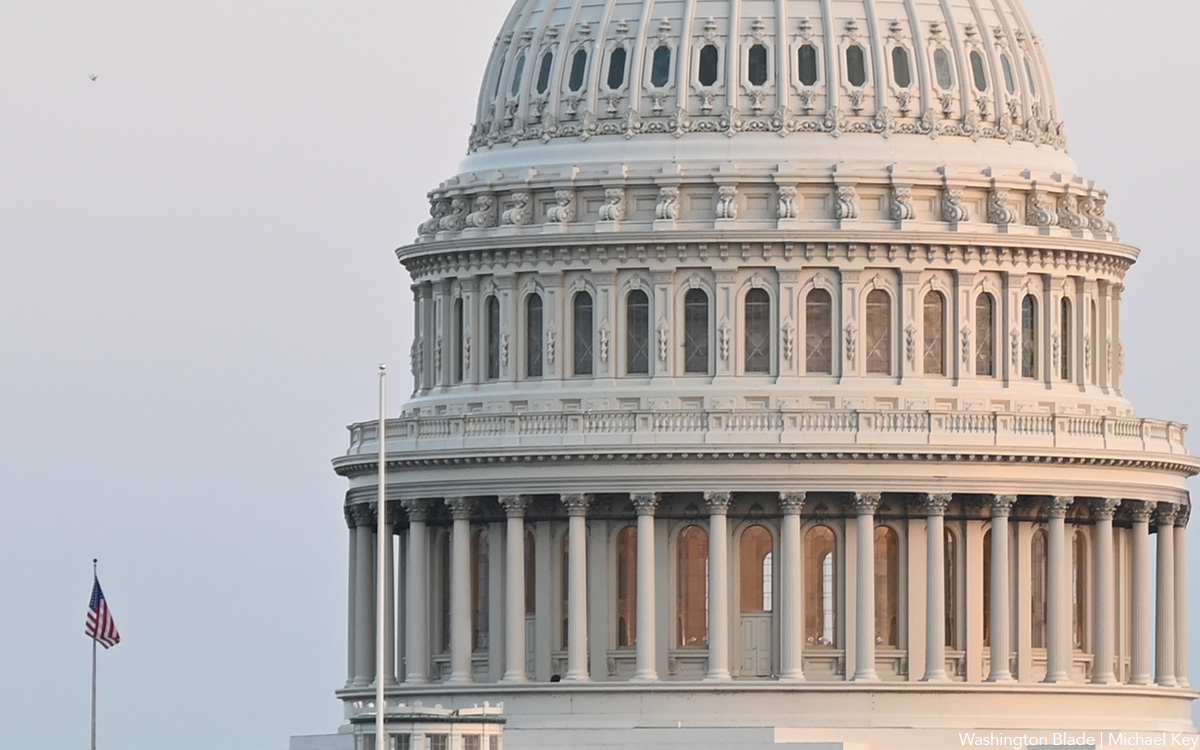
President Donald Trump on Wednesday signed a bill that reopens the federal government.
Six Democrats — U.S. Reps. Jared Golden (D-Maine), Marie Gluesenkamp Perez (D-Wash.), Adam Gray (D-Calif.), Don Davis (D-N.C.), Henry Cuellar (D-Texas), and Tom Suozzi (D-N.Y.) — voted for the funding bill that passed in the U.S. House of Representatives. Two Republicans — Thomas Massie (R-Ky.) and Greg Steube (R-Fla.) — opposed it.
The 43-day shutdown is over after eight Democratic senators gave in to Republicans’ push to roll back parts of the Affordable Care Act. According to CNBC, the average ACA recipient could see premiums more than double in 2026, and about one in 10 enrollees could lose a premium tax credit altogether.
These eight senators — U.S. Sens. Catherine Cortez Masto (D-Nev.), Dick Durbin (D-Ill.), John Fetterman (D-Pa.), Maggie Hassan (D-N.H.), Tim Kaine (D-Va.), Angus King (I-Maine), Jacky Rosen (D-Nev.), and Jeanne Shaheen (D-N.H.) — sided with Republicans to pass legislation reopening the government for a set number of days. They emphasized that their primary goal was to reopen the government, with discussions about ACA tax credits to continue afterward.
None of the senators who supported the deal are up for reelection.
King said on Sunday night that the Senate deal represents “a victory” because it gives Democrats “an opportunity” to extend ACA tax credits, now that Senate Republican leaders have agreed to hold a vote on the issue in December. (The House has not made any similar commitment.)
The government’s reopening also brought a win for Democrats’ other priorities: Arizona Congresswoman Adelita Grijalva was sworn in after a record-breaking delay in swearing in, eventually becoming the 218th signer of a discharge petition to release the Epstein files.
This story is being updated as more information becomes available.

Former Vice President Dick Cheney died of complications from pneumonia and cardio and vascular disease, according to a family statement released Tuesday morning. He was 84.
Cheney served as vice president under President George W. Bush for eight years and previously as defense secretary under President George H.W. Bush. He also served as a House member from Wyoming and as White House chief of staff for President Gerald Ford.
“Dick Cheney was a great and good man who taught his children and grandchildren to love our country, and to live lives of courage, honor, love, kindness, and fly fishing,” his family said in a statement. “We are grateful beyond measure for all Dick Cheney did for our country. And we are blessed beyond measure to have loved and been loved by this noble giant of a man.”
Cheney had a complicated history on LGBTQ+ issues; he and wife Lynne had two daughters, Liz Cheney and Mary Cheney, who’s a lesbian. Mary Cheney was criticized by LGBTQ+ advocates for not joining the fight against President George W. Bush’s push for a constitutional amendment banning gay marriage. She later resumed support for LGBTQ+ issues in 2009, including same-sex marriage, after her father left office in 2009. She married her partner since 1992, Heather Poe, in 2012.
In 2010, after leaving office, Cheney predicted “Don’t Ask, Don’t Tell” would “be changed” and expressed support for reconsideration of the law banning open military service.
In 2013, the Cheney family’s disagreements over marriage equality spilled into the public eye after Liz Cheney announced her opposition to same-sex couples legally marrying. Mary Cheney took to Facebook to rebuke her sister: “Liz – this isn’t just an issue on which we disagree – you’re just wrong – and on the wrong side of history.” Dick and Lynne Cheney were supporters of marriage equality by 2013. Liz Cheney eventually came around years later.
Cheney, a neo-con, was often criticized for his handling of the Iraq war. He was considered one of the most powerful and domineering vice presidents of the modern era. He disappeared from public life for years but re-emerged to help Liz Cheney in her House re-election bid after she clashed with President Trump. Dick Cheney assailed Trump in a campaign video and later Liz announced that her father would vote for Kamala Harris in the 2024 presidential election.
State Department
State Department’s 2024 human rights report could jeopardize LGBTQ+ asylum cases
‘Targeted and malicious act’ will ‘directly endanger lives’

Advocacy groups say the State Department’s 2024 human rights report that “erased” LGBTQ+ people will jeopardize the cases of those who are seeking asylum in the U.S.
Immigration Equality notes the report “serve as key evidence for asylum seekers, attorneys, judges, and advocates who rely on them to assess human rights conditions and protection claims worldwide.”
The 2024 report the State Department released on Aug. 12 did not include LGBTQ+-specific references. Immigration Equality Director of Law and Policy Bridget Crawford in a statement said country-specific reports within the larger report “should be accurate, fact-based, and reflect the lived reality of LGBTQ people — not ignore and actively hide it.”
“When adjudicators see less information in these reports than in prior years, they may wrongly assume conditions have improved,” said Crawford. “In truth, the absence of reporting is a purely political move, not based in fact or reality.”
Organization for Refuge, Asylum and Migration Executive Director Steve Roth in a statement condemned the Trump-Vance administration’s “deliberate erasure of LGBTIQ communities from the 2024 human rights report — an unprecedented move that violates international standards.”
“This is a targeted and malicious act that will directly endanger lives,” he said.
Roth, like Immigration Equality, noted courts “around the world rely on these reports to evaluate asylum claims.”
“Stripping out documentation of LGBTIQ persecution removes a vital tool in assessing claims for protection, jeopardizing the ability of LGBTIQ asylum seekers to access safety,” said Roth.
Congress requires the State Department to release a human rights report each year.
The State Department usually releases them in the spring, as opposed to August. Then-State Department spokesperson Tammy Bruce, who president Donald Trump has nominated to become deputy representative at the U.N., during her last press briefing on Aug. 12 defended the delay and the report itself.
“We weren’t going to release something compiled and written by the previous administration,” said Bruce. “It needed to change based on the point of view and the vision of the Trump administration, and so those changes were made.”
Asylum courts ‘will have less credible data to rely on’
Jessica Stern, the former special U.S. envoy for the promotion of LGBTQ+ and intersex rights under the Biden-Harris administration, co-founded the Alliance for Diplomacy and Justice with several other former State Department officials.
The Alliance for Diplomacy and Justice in response to the report said the U.S. has “betrayed the trust of human rights defenders who risked their safety to share the truth” and added “some (of them) are now less safe.”
“Asylum courts in the U.S. and globally will have less credible data to rely on,” said the group.
Human Rights Watch echoed the Alliance for Diplomacy and Justice.
“The human rights report has been used in U.S. asylum court cases to show that an asylum seeker could not be returned to a country where similarly situated people were being persecuted,” said Human Rights Watch in response to the 2024 report. “That essential resource for keeping people safe is not only no longer reliable or helpful, but in some cases could put people at risk by denying abuses in places where the United States or other countries intend to deport asylum seekers and immigrants.”
State Department
LGBTQ people ‘erased’ from State Department’s 2024 human rights report
Document released Tuesday after months of delay

Advocacy groups on Tuesday sharply criticized the removal LGBTQ-specific references from the State Department’s 2024 human rights report.
The report, which the State Department released on Tuesday, does not reference Uganda’s Anti-Homosexuality Law and the impact it has had on the country’s LGBTQ community since President Yoweri Museveni signed it in 2023. The report, however, does note Ugandan government officials “reportedly committed acts of sexual violence.”
“NGOs reported police medical staff subjected at least 15 persons to forced anal examinations following their arrests,” it reads. “Opposition protesters stated security forces used or threatened to use forced anal examinations during interrogations.”
Uganda is among the dozens of countries in which consensual same-sex sexual relations remain criminalized. Authorities in the African country often use so-called anal tests to determine whether someone has engaged in homosexuality.
The report does not mention that Brazil has the highest number of reported murders of transgender people in the world. It does, however, note the President Luiz Inácio Lula da Silva in 2024 “undermined democratic debate by restricting access to online content deemed to ‘undermine democracy,’ disproportionately suppressing the speech of supporters of former President Jair Bolsonaro as well as journalists and elected politicians, often in secret proceedings that lacked due process guarantees.”
The report says there “were no credible reports of significant human rights abuses” in Hungary in 2024, even though Prime Minister Viktor Orbán’s government continued its anti-LGBTQ rights crackdown. The report does note Russian authorities last year “invoked a law prohibiting the distribution of ‘propaganda on nontraditional sexual relations’ to children.”
The State Department’s 2023 human rights report specifically notes a Russian law “prohibited gender transition procedures and gender-affirming care … and authorities used laws prohibiting the promotion of ‘non-traditional sexual relations’ to justify the arbitrary arrest of LGBTQI+ persons.” The 2023 report also cites reports that “state actors committed violence against LGBTQI+ individuals based on their sexual orientation or gender identity, particularly in Chechnya” and “government agents attacked, harassed, and threatened LGBTQI+ activists.”
“There were instances of non-state actor violence targeting LGBTQI+ persons and of police often failing to respond adequately to such incidents,” it adds.
The 2024 report does not mention Thai lawmakers last year approved a bill that extended marriage rights to same-sex couples. Gays and lesbians began to legally marry in the country in January.
Jessica Stern, the former special U.S. envoy for the promotion of LGBTQ and intersex rights under the Biden-Harris administration who co-founded the Alliance for Diplomacy and Justice, during a conference call with reporters on Tuesday said she and her colleagues “expected (the report) to be bad.”
“When we saw what the administration released, the truth is we were shocked and horrified,” said Stern.
Stern added the Trump-Vance administration “has erased or watered-down entire categories of abuse against people of African descent, indigenous people, Roma people, members of other marginalized racial and ethnic communities, workers, women and girls, and LGBTQI+ people.”
“It is deliberate erasure,” said Stern.
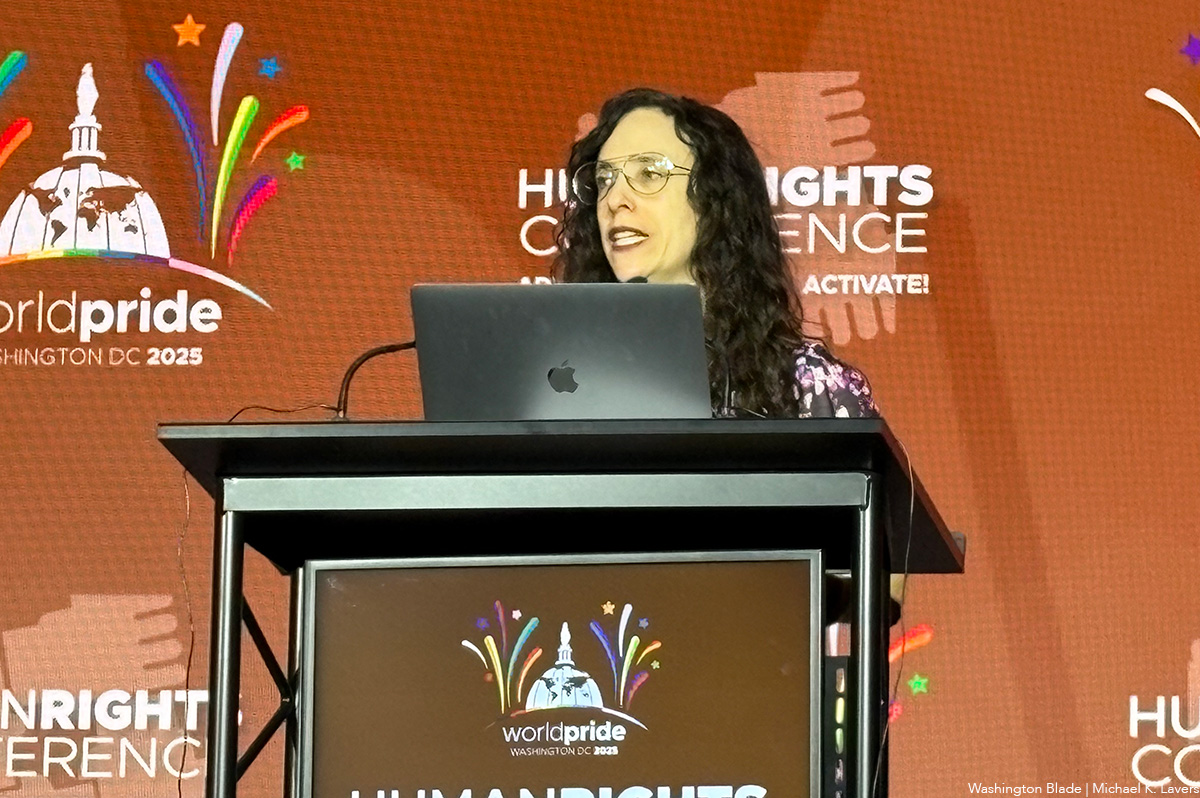
The Council for Global Equality in a statement condemned “the drastic restructuring and glaring omission of violence and abuse targeting lesbian, gay, bisexual, transgender, queer, and intersex (LGBTQI+) persons in the U.S.”
“We denounce the Trump administration’s efforts to politicize the State Department’s annual human rights reports by stripping longstanding references to human rights abuses targeting LGBTQI+ and other marginalized groups,” said Mark Bromley, the group’s co-chair.
Gay U.S. Rep. Mark Takano (D-Calif.), who chairs the Congressional Equality Caucus, echoed Bromley and Stern.
“Omitting the persecution of LGBTQI+ people from the human rights reports doesn’t erase the abuse, violence, and criminalization our community is facing around the world — it condones it,” said Takano in a statement.
“Erasing our community from these reports makes it that much harder for human rights advocates, the press, and the American people to be aware of the abuses LGBTQI+ people are facing worldwide,” he added.
Congress requires the State Department to release a human rights report each year. Foggy Bottom usually releases it in the spring.
Politico in March reported the Trump-Vance administration planned to cut “sections about the rights of women, the disabled, the LGBTQ+ community, and more” from the human rights report. State Department spokesperson Tammy Bruce, who President Donald Trump has nominated to become deputy representative at the U.N., on Tuesday during her last press briefing defended the report and the delay in releasing it.
“We weren’t going to release something compiled and written by the previous administration,” said Bruce. “It needed to change based on the point of view and the vision of the Trump administration, and so those changes were made.”
“It certainly promotes, as does our work, a respect for human rights around the globe,” added the former Fox News contributor who has described herself as a “gay woman.”
The Council for Global Equality and Democracy Forward has filed a Freedom of Information Act lawsuit. A press release notes it is “seeking the release of additional information … including any instructions provided by political appointees to strip references to abuses against LGBTQI+ persons from the reports.”
“The reports make LGBTQI+ persons and other minorities invisible and, in so doing, they undermine the human rights landscape that protects all of us,” said Bromley.
“Erasing our community from these reports makes it that much harder for human rights advocates, the press, and the American people to be aware of the abuses LGBTQI+ people are facing worldwide,” added Takano. “Failing to rectify this censorship will have real — and potentially deadly — consequences for LGBTQI+ people, including both for those who travel abroad from the U.S. and for LGBTQI+ people in countries whose leadership no longer need to worry about consequences for their human rights abuses. The State Department must reverse course and restore the LGBTQI+ section to these reports.”
A State Department spokesperson told the Washington Blade the “information included in the 2024 reports has been restructured and streamlined for better utility and accessibility, and to be more responsive to the legislative mandate for the (human rights report.)”
“The result directly addresses the reporting requirements as laid out in statute as well as being more streamlined, objective, universal, and accessible to the American public,” said the spokesperson.
The spokesperson did not comment on the FOIA lawsuit the Council for Global Equality and Democracy Forward has filed.

U.S. Citizenship and Immigration Services on Monday announced it will ensure “male aliens seeking immigration benefits aren’t coming to the U.S. to participate in women’s sports.”
The announcement notes USCIS “has clarified eligibility for certain visa categories: O-1A aliens of extraordinary ability, E11 aliens of extraordinary ability, E21 aliens of exceptional ability, and for national interest waivers (NIWs), to guarantee an even playing field for all women’s athletics in the United States.” The new policy comes roughly six months after President Donald Trump issued an executive order that bans transgender women and girls from female sports teams in the U.S.
“Men do not belong in women’s sports. USCIS is closing the loophole for foreign male athletes whose only chance at winning elite sports is to change their gender identity and leverage their biological advantages against women,” said USCIS spokesperson Matthew Tragesser. “It’s a matter of safety, fairness, respect, and truth that only female athletes receive a visa to come to the U.S. to participate in women’s sports.”
“The Trump administration is standing up for the silent majority who’ve long been victims of leftist policies that defy common sense,” added Tragesser.
USCIS in April announced it will only recognize “two biological sexes, male and female.” Trump shortly after he took office for a second time on Jan. 20 signed the “Defending Women from Gender Ideology Extremism and Restoring Biological Truth to the Federal Government” executive order.
The 2028 Summer Olympics will take place in Los Angeles.
The U.S. Olympic and Paralympic Committee last month banned trans women from competing in women’s sporting events.
The Guardian earlier this year reported the State Department ordered consular officials “to deny visas to transgender athletes attempting to come to the U.S. for sports competitions, and to issue permanent visa bans against those who are deemed to misrepresent their birth sex on visa applications.”
Germany and Denmark are among the countries that have issued travel advisory for trans and nonbinary people who are planning to visit the U.S. The warnings specifically note the Trump-Vance administration has banned the State Department from issuing passports with “X” gender markers.
“This policy update clarifies that USCIS considers the fact that a male athlete has been competing against women as a negative factor in determining whether the alien is among the small percentage at the very top of the field,” reads the USCIS announcement. “USCIS does not consider a male athlete who has gained acclaim in men’s sports and seeks to compete in women’s sports in the United States to be seeking to continue work in his area of extraordinary ability; male athletes seeking to enter the country to compete in women’s sports do not substantially benefit the United States; and it is not in the national interest to the United States to waive the job offer and, thus, the labor certification requirement for male athletes whose proposed endeavor is to compete in women’s sports.”
The new USCIS guidance takes effect immediately.
California Politics
How Triston Ezidore became the first gay, Black board member in Culver City at 19 years old, making history—twice!
At 19, Ezidore felt like it was his responsibility to track the educational movements in the Culver City Unified a bit more closely
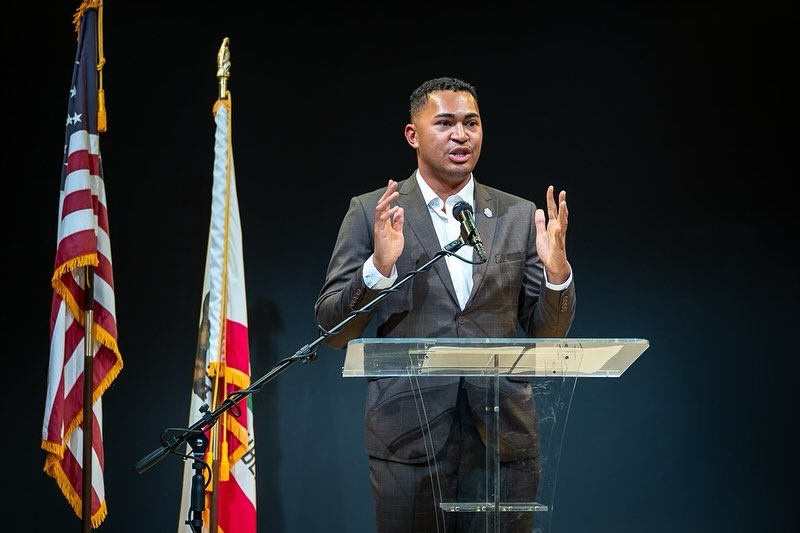
While most teenagers are busy playing video games, Triston Ezidore was busy making history.
From high school student to school board member for the Board of Education in Culver City, Ezidore talks with the LA Blade about his unconventional entry into politics with influence from George Floyd’s death and the COVID-19 pandemic, and how he made history twice while he was still a teenager.
In 2021, most of us were still at home and many people unemployed, out of school, caring for loved ones or just merely surviving the pandemic shutdowns and peak infections caused by COVID-19. During this time, many high school students lost valuable time in the classroom, being cut off from celebrating and socializing with their peers. Young Ezidore, rose above that—and more—achieving new milestones within his family and within the entire board of education in Culver City, bringing representation to queer, trans and communities of color.
Shortly after graduation, Ezidore headed to Syracuse University and from afar, he continued to tune into the Culver City school board meetings to track the progress he had made during his time as student body president in high school.
“I was still kind of watching, tuning into everything that was going on in Culver City and we knew that in order to get [the progress] right, we had to have a spotlight over the implementation,” said Ezidore.
It was during this time, that he noticed that all the progress he tried to implement during his time there, was not being implemented correctly, so he felt like it was his responsibility to track the movements a little more closely.
This is when he made the decision to return home and enroll at University of Southern California’s Dornsife College of Letters, Arts and Sciences—where he simultaneously launched his campaign for a seat on the Culver City Unified School District Board of Education.
In 2022—just one year after graduating high school—he won one of three open seats, becoming the youngest elected official in Los Angeles County at 19 years old. Then in 2023, he was elected to serve as School Board Vice President—making history as the first Black, gay man in that position as a teenager.
Though his journey into politics is “unconventional” as he puts it, Ezidore says he was radicalized to go into politics because of George Floyd’s death and the inequities made incredibly obvious by the COVID-19 pandemic.
Ezidore says that being the child of immigrants also inspired him to ultimately look into politics to gain a better understanding of how his perspective can be helpful towards other people’s experiences and educational goals.
His mother was born in Vietnam and moved to the United States after the fall of Saigon, which was the end of the Vietnam war that lasted from 1955 to 1975. Ezidore’s father is from Jamaica, so that gives Ezidore a unique perspective into the challenges and unique obstacles that many students face during their K-12 education.
Ezidore also identifies as gay and has been out since he was 18 years old.
“I find myself identifying as a gay, Black man, and I know that under this administration specifically, there has been an obsession with LGBTQ people and trans people in education,” said Ezidore. “I think historically our [education] system has not supported Black boys in education as a whole, so I find myself often pulling or tapping into those aspects of my identity.”
As a proud, gay, Black man, he felt that it was necessary to implement actual structures to support the most neglected demographic of the education system.
“We instituted the Black Student Achievement Plan that called for specific action goals to implement or to increase achievement,” said Ezidore.
This plan created mentorship and internship opportunities, a Black student council, a Black affinity group graduation and uplifted students in achieving their goals. During that time, former governor Jerry Brown stated that school districts should implement a Local Control and Accountability Plan (LACP). The plan serves as a tool to improve student outcomes with a roadmap that tracks and sets goals and plan actions, and leverages resources to guide students who were foster youth, low-income and English-learners.
“I don’t know that [Trump] is going to withhold the funding, but to me, I don’t know if I could sleep at night if I let him dictate these [educational] outcomes for the students in Culver City,” he said.
The latest update from the Supreme Court is that Trump is allowed to continue dismantling the U.S. Department of Education, worrying scholars throughout the country, with many saying that without an injunction, much of the damage can be irreversible. The Department of Education has already experienced the slashing of over 1,400 jobs and will continue to see more funding cuts due to the Reduction in Force (RIF) plan, implementing Trump’s Executive Order, which he claims will improve education and families by returning education authority to individual states.
-

 Bars & Parties14 hours ago
Bars & Parties14 hours agoSoCal queer singles come together as we celebrate LA’s Top Eligible LGBTQ Singles at the Abbey this Thursday!
-

 Los Angeles3 days ago
Los Angeles3 days agoProject Angel Food is now able to feed 10,000 people daily with expanded building
-

 a&e features5 days ago
a&e features5 days agoAngel McCoughtry, “Renaissance Woman”
-

 Movies5 days ago
Movies5 days ago50 years later, it’s still worth a return trip to ‘Grey Gardens’
-

 Sports4 days ago
Sports4 days agoMichael Ferrera is paving a path of safety and liberation for queer athletes
-

 Arts & Entertainment4 days ago
Arts & Entertainment4 days ago2026 Best of LGBTQ LA Readers’ Choice Award Nominations
-

 AIDS and HIV2 days ago
AIDS and HIV2 days agoCongresswoman Maxine Waters introduces new resolution for National Black HIV/AIDS Awareness Day
-

 Sports4 days ago
Sports4 days agoBlade, Pride House LA announce 2028 Olympics partnership
-

 Commentary1 day ago
Commentary1 day agoAre we done with ‘Drag Race?’
-

 Books2 days ago
Books2 days agoNew book explores homosexuality in ancient cultures









